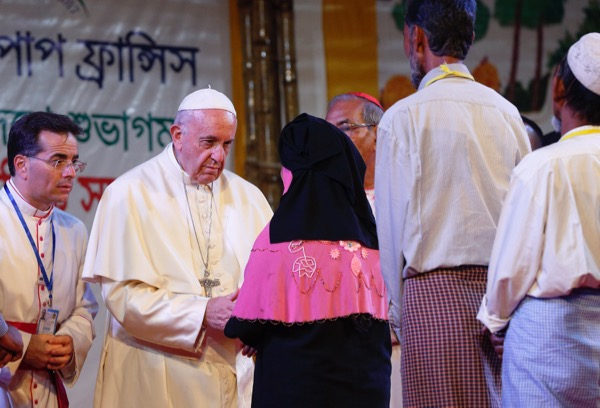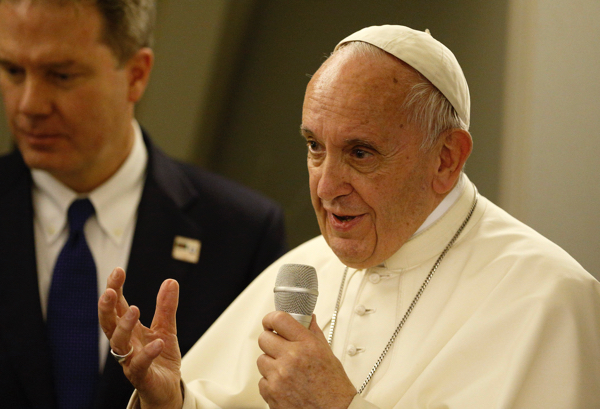By Christopher Lamb on board the Papal Plane
Pope Francis gave Myanmar’s generals a clear message during his private meeting with them this week but refrained from mentioning the Rohingya Muslims in public to avoid “slamming the door” on dialogue, he told journalists.
The 80-year-old pontiff was speaking to reporters on board his plane flying back from a six-day South Asia trip that has been dominated by the Rohingya humanitarian disaster, described by the United Nations as a “text book case” of ethnic cleansing.
While in Myanmar, where military forces have driven out close to a million of the ethnic group, the Pope was criticised for not explicitly mentioning them by name during his public speeches.
But Francis told reporters that he “said what he had to say” in private and adopted a diplomatic approach in public. That meant not mentioning the “R-word”, something which is heavily contested in Myanmar.
His trip is one that would have severely tested the most skilled international diplomat: a complex geopolitical cocktail of a humanitarian crisis, a ruthless military regime accused of ethnic cleansing and a desperately poor country trapping with an influx of up to million refugees.
While the country formerly known as Burma is transitioning to democracy under the leadership of Aung San Suu Kyi, the military still retain the real power. Just hours after the Pope landed in Yangon, there was a request from the country’s top general to see Francis.
“The General asked to speak and I received him. I never shut the door. Who wants to talk comes. One can’t lose anything by talking. You can only gain,” he told reporters. “It was a good conversation. I can’t talk about it because it was private, but I did not negotiate the truth. I made sure he understood that old ways are not viable nowadays. It was a good meeting, civilised, he received the message.”
He explained: “I was very very satisfied by the meetings [in Myanmar] that I was able to have because its true, let’s say, I didn’t have the pleasure of slamming the door, publicly, a denouncement, but I had the satisfaction of dialogue, of letting the other speak, saying what I had to say and in this way, the message arrived.”
Unusually, the hour long press conference focussed almost exclusively on questions about his visit without broadening out into other areas.
This came about following an unusual intervention from the Pope where he asked if anyone else wanted to ask about the visit leading to a flurry of hands going up and meaning there was only time for one non-trip related question.
When it comes to dealing with military regimes Francis has first hand experience having been leader of the Jesuits in Argentina when the junta were waging their brutal dirty war. And while the world knows him for his freewheeling, open style the Pope who knows how to walk diplomatic tightropes and when to choose his words carefully.
His refusal to use the word Rohingya in Myanmar was also tacit support for Aung San Suu Kyi, the Nobel Laureate who has been heavily criticised for not doing more during the crisis and who also refuses to use the “R-word”.
In the press conference the Pope refused to offer any negative judgment on her. “She was criticised for not having gone to Rakhine province [from where the Rohingya come from]. In the end she did go there for half a day, more or less but in Myanmar it’s difficult to judge a criticism without asking first whether it was possible to do something like that,” he said. “Myanmar is a developing country, in transition. Politically speaking. That’s why possibilities need to be evaluated/judged also under this point of view.”
At the same time, Francis made it clear he feels the pain of the Rohingya deeply, saying that when he met a group of them at an interfaith prayer gathering in Dhaka he was crying. He also bristled at a question by one reporter who asked why, after not mentioning them in Myanmar, he apologised to them during his encounter – it was here that he used the word Rohingya for the only time on the trip.
“Yesterday wasn’t the first time, several times in public from St. Peters Square at an Angelus with the audience I mentioned them,” he said. “Your question is interesting because it makes me reflect on how I try to communicate. For me the most important thing is that the message arrives.” He suggested that denunciations by the media – “you who are specialists in delivering the news” – produces the result of “closing the door” on dialogue.
Pointing out that the Rohingya have been designated as the most persecuted religious ethnic minority on earth at this present time, the Pope said: “This is a point one must go back to and make reparation.” He went on: “From that point one must dialogue, one step then another step. Maybe half a step backward, another step forward. It will not be easy, but with dialogue, never with punishment, never with war.”
Away from South Asia, Francis explained he had recently condemned the possession of nuclear weapons due to the world’s “irrationality.”
This was in response to a question which pointed out that in 1982 John Paul II argued that it was morally acceptable to possess nuclear weapons with Francis being asked what had changed since then.
“Irrationality is what has changed,” he said. “Because today with such sophisticated nuclear arsenals we risk the destruction of humanity, or at least a big part of it.” He went on: “they are capable of destroying people without touching the structures. But we are at the limit. Because we are at the limit I ask myself this question, not as pontifical magisterium but it’s a question a Pope asks himself.
"Today is it licit to maintain nuclear arsenals as they are or or today, in order in order to save creation? Is it not necessary to [go] back and think of Hiroshima and Nagasaki?”
Francis repeatedly stressed he wanted to ensure his whole visit gave a clear message. And it was by demonstrating the humble, authentic hallmarks he has brought to the papal office that he managed to reach people.
Upon arrival at the airport in Dhaka he bowed in front of the Bangladesh flag while designated himself simply as “Roman Catholic Bishop” in a visitors book at a shrine to those who died for Bangladeshi independence. Both these acts also symbolised his appreciation of Bangladesh’s generous sacrifice in welcoming of hundreds of thousands of Rohingya despite the country being heavily overpopulated. “For a poor and small country, they received 700,000. I think of countries that close their doors,” he said. “We have to be grateful for the example that they gave us.”
Photo: Pope Francis answers questions from journalists aboard his flight from Dhaka, Bangladesh, to Rome Dec. 2. Also pictured is Greg Burke, Vatican spokesman. (CNS photo/Paul Haring)
Read more in The Tablet from Myanmar and Bangladesh
Christopher Lamb's View from Yangon
Tablet subscribers can also read these two curtain raisers by Richard Cockett:



 Loading ...
Loading ...